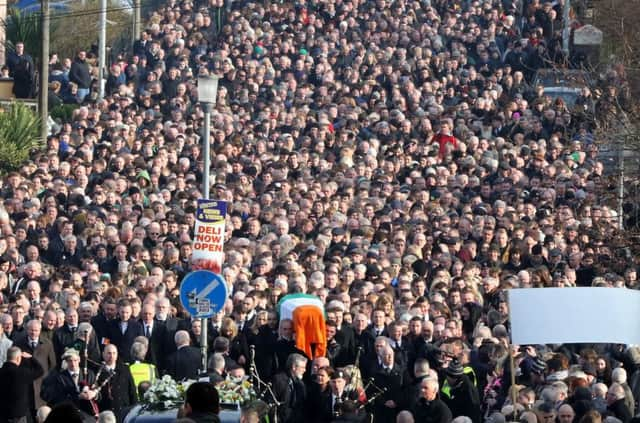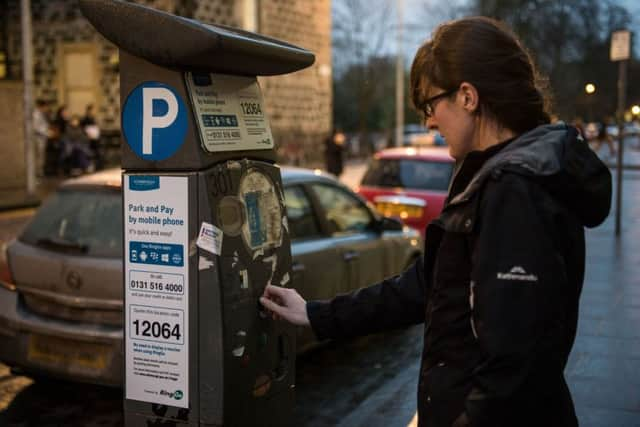Helen Martin: History of Troubles casts a long shadow


It was also completely understandable that those who had lost loved ones as a result of IRA atrocities were among the first to declare the world was a better place without the IRA leader.
But the less predictable and more interesting responses came from those who had to fully understand and research the history of Northern Ireland and appreciate the cause of the Troubles, along with those who worked – alongside McGuinness – on the peace process.
Advertisement
Hide AdAdvertisement
Hide AdA prize example of that is the BBC’s John Simpson, one of the most experienced journalists in the world when it comes to foreign affairs, international politics and war zones.


He compared McGuinness to Nelson Mandela – a comment met with gasps of horror from some, particularly in England where there was little understanding about the turmoil in Northern Ireland which began in the late-60s.
Back then there was no such thing as satellite TV packages, the internet or social media. The only information available to the public came from the UK government, national TV and newspapers, all subject to various measures of control.
In England there was no sectarianism. The High Church of England and the Catholic Church were separated by as little as a Rizzla paper, Catholic schools were prized and admired and someone’s religion was a personal matter.
Advertisement
Hide AdAdvertisement
Hide AdTo many at the time, it appeared as if the IRA was a bunch of gangsters who suddenly exploded (literally) on the scene intent on murder.


While no-one – then or now – could or should condone IRA attacks, understanding the cause of the problem was crucial.
Only those who owned a house in Northern Ireland had the right to vote. Catholics were not eligible for employment in most companies, their earnings were restricted and few could buy a home. Gerrymandering succeeded in taking away what little voice they had. They were given the worst social housing as Protestants came first, and universities were built in Unionist, not Catholic, areas.
The police force was entirely Unionist and Protestant and civil rights marches were dampened down with the pleas ignored while Orange Lodge marches were celebrated.
Advertisement
Hide AdAdvertisement
Hide AdIn short, the British government was presiding over a sectarian version of apartheid and persecution on its own territory. Hence John Simpson’s reference to Nelson Mandela.
For young Catholic men and women such as McGuinness, taking up arms was hardly surprising. As the violence built up the IRA understandably and justifiably faced more hatred from the UK public. But it was many years before the truth about Bloody Sunday and other reciprocal atrocities came out.
The peace process began behind the scenes as the British finally admitted they could not break the back of the IRA, and the IRA admitted they couldn’t win either.
Among the first and most influential to the table, bringing the IRA and Sinn Fein with him and orchestrating the Republican ceasefire, was McGuinness.
Advertisement
Hide AdAdvertisement
Hide AdThose who praised the man last week were those of any or no religion who knew the background and understood Britain was in many ways substantially responsible for the Troubles. Giving McGuinness credit was as close as they could come to publicly acknowledging that.
Why not have a ‘vision’ for city’s people?
LABOUR’S proposed workplace parking levy in its council manifesto may be welcomed by environmentalists.
I doubt it will be welcomed by low-paid workers on shift work who can’t afford to live in Edinburgh and have to drive long distances to work in the city – if they can negotiate free parking on the premises.
It also puts the council on the same page as Consort, raising parking charges at the ERI.
Advertisement
Hide AdAdvertisement
Hide AdLabour might claim to have a “vision for transport”. Sadly it has little vision for people. . . . or animals.
Tory Joanna Mowat’s call to consider silent fireworks has been kicked out by officials who found no evidence of harm and said there was “a wealth of information” to minimise pet stress.
Several dogs become critically stressed as any vet will testify, causing emotional and financial pain for owners.
Still, perhaps the parking levy will go to towards the huge and unnecessary fireworks bill.
They’re not the brightest of sparks
Advertisement
Hide AdAdvertisement
Hide AdAN effort to install gas central heating in a rental flat involved 12 days of torture, 17 phone calls to nine different numbers, on the blower for four hours a day, three efforts at booking a meter installation (having jumped through all hoops required) only to be told I had wasted my time.
No-one at ScottishPower checked in the first place that the flat number, as it appears on council tax and electricity bills, matched that on the Royal Mail database, without which no gas meter was permitted. It was possible to correct that but it meant re-joining the back of the queue and waiting for another month.
Oh, for the simple days when there was one, nationalised board each for gas and electricity and sufficient staff to answer the ruddy phone.
I ran out of gas. We’re staying all-electric.
Testing times are not for me
AND now from California, a genetic test giving a 15-year warning of when one might develop Alzheimer’s. Who wants to live under that cloud?